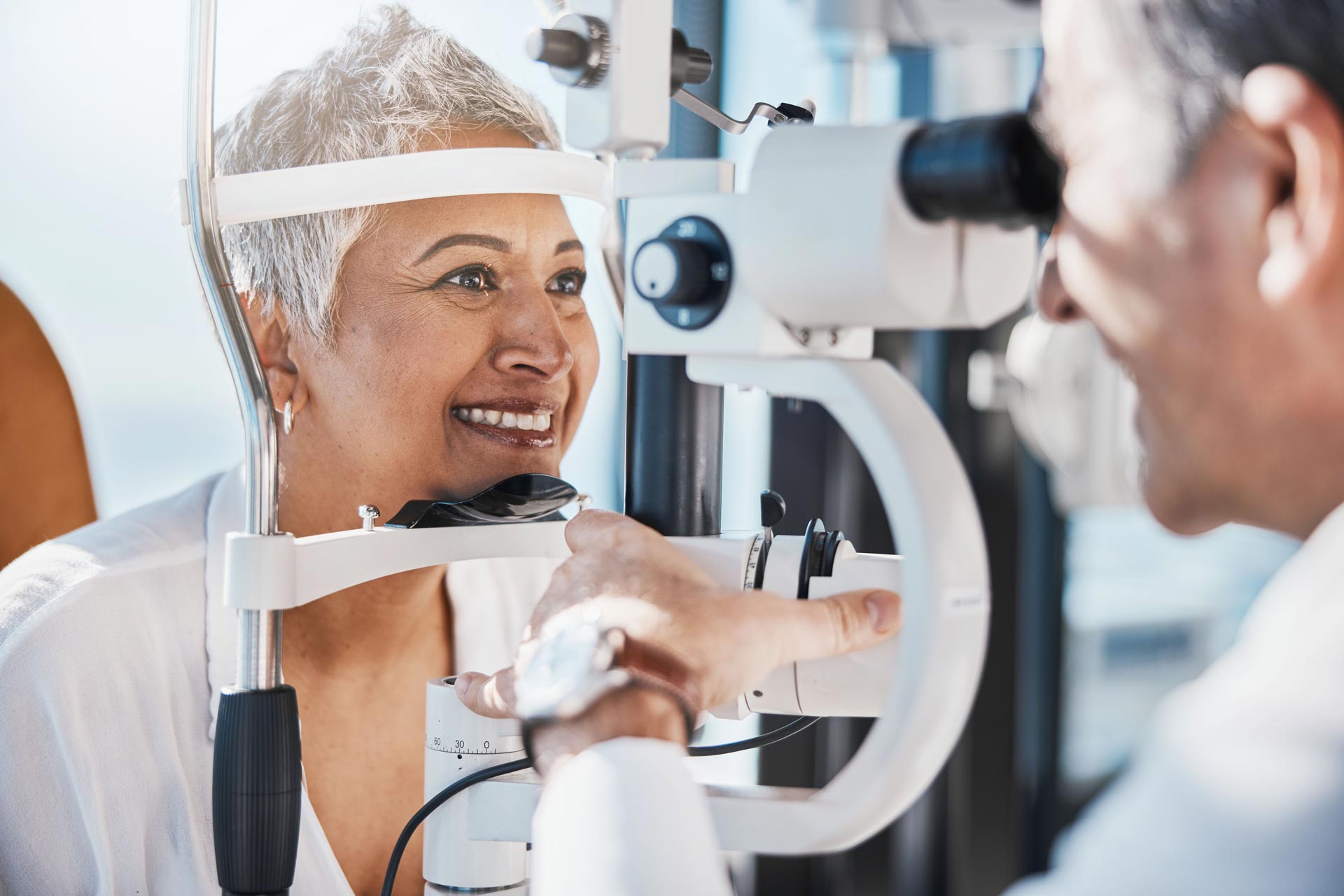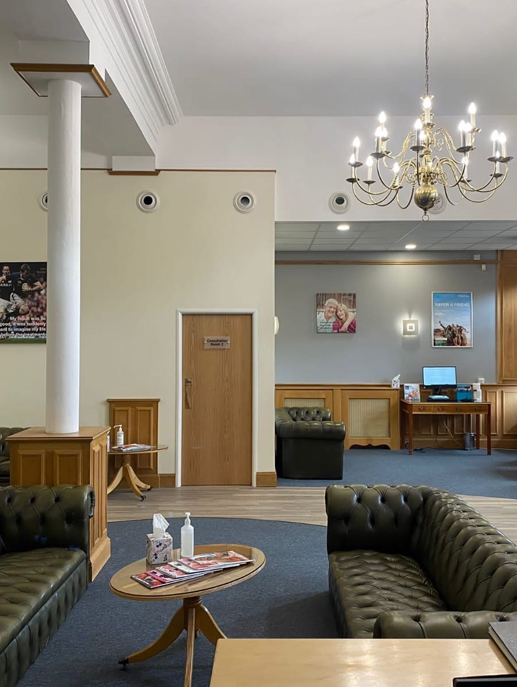Reach Us
Book An Appointment
Please fill out the form below to connect with one of our advisors and start your booking process. They will call to discuss your visual requirements and finalise the appointment booking.

Refractive Lens Exchange (RLE) is a surgical procedure commonly used to treat presbyopia, hyperopia (farsightedness), and other refractive errors. Unlike LASIK or PRK, which reshape the cornea, RLE involves replacing the eye's natural lens with an artificial intraocular lens (IOL) to improve vision.
In Refractive Lens Exchange (RLE), different types of intraocular lenses (IOLs) can be used to replace the eye's natural lens and provide vision correction. The three main types of IOLs used in RLE are monofocal, extended depth of focus (EDOF), and multifocal. Each type offers unique benefits and considerations.
Your ophthalmologist will conduct a comprehensive eye exam to assess your candidacy for RLE and determine the most suitable intraocular lens for your needs. RLE is typically performed on an outpatient basis under local or topical anesthesia. During the procedure, the natural lens is removed and replaced with the selected intraocular lens.
Following the treatment, patients may experience minor discomfort or temporary changes in vision, but these usually subside within a few days. Most patients can resume normal activities within a week after surgery.
Taking the decision to have RLE surgery should leave you with vastly improved vision and the ability to see things much more clearly and in greater focus. Some of the benefits include:
We don't vary our prices according to prescription. We've made it simple, our lens surgery costs are fixed so there are no surprises. Our refractive lens exchange surgery costs between £3,495 per eye (£6,990 for both eyes) and £3,995 per eye (£7,990 for both eyes), depending on the type of lens needed.

After your treatment we will provide you with drops to keep your eyes hydrated, reduce discomfort, and help with the healing process. We offer up to one year of free aftercare, which includes a number of appointments as we continue to check on your progress and recovery. Your first visit will take place a day or two after the procedure, with another scheduled in for a week or so later. We’ll also ask you to come back in around 4-6 weeks down the line and, if everything seems satisfactory, you will be discharged after 3-6 months.

We are recognised providers of cataract surgery for several Private Health Insurance Companies. Please let us know as soon as possible if you think this may be relevant to you and always check with your insurance provider before arranging any treatment.
Below you’ll find answers to some of the most common questions we receive. We are constantly keeping track of what information our patients are interested in and aim to provide it in the simplest form possible. If you cannot find the answers you are looking for within this section, please don't hesitate to get in touch with one of our advisors who are on standby to discuss your visual requirements and respond to your queries.
Undergoing lens replacement surgery means that cataracts cannot form at a later stage, and you should be able to see things much more clearly and in greater focus. The operation itself only lasts approximately 15 minutes and the results are permanent, while recovery is usually swift. Opting for Refractive Lens Exchange RLE with multifocal lenses may eliminate the need for reading glasses. We’re pleased to say that 95% of people who rely on Optimax for this type of lens surgery come away having achieved driving standard vision or better.
Most patients say that the RLE procedure is comfortable. We administer numbing eye drops before treatment so that you won’t feel pain during the surgery, although you may feel some pressure. Afterwards, there may be some mild discomfort as your eyes begin to heal, but this can usually be managed with eye drops.
he process for refractive lens surgery is exactly the same as cataract surgery, which was undertaken approximately 434,000 times in England and Wales in 2017-18, according to the National Ophthalmology Database. The risks of serious complications from cataract surgery are described by the NHS as “very low”. The risk of infection after RLE and cataract surgery occurs in less than 1 in 1,000 people (0.1%), and you will be subject to careful checks both before and after your RLE surgery, so you can rest assured that you’re in the very safest hands with us here at Optimax.
We only use the best phaco machines available on the market. All manufacturers use world-class technology, providing high-quality outcomes, and are involved in ongoing research to bring safer, more accurate lasers to market.
The surgery itself only lasts around 10 to 15 minutes, although you may be in the treatment room a little longer than that. You should plan to be at the clinic for up to four hours, as there will be preparation time as well as conversations with a patient advisor to take into account.
Your lenses are designed to last for approximately 100 years, so you can be confident that they will continue to work effectively for the remainder of your lifetime.
Your vision may be slightly blurred for a few days following refractive surgery, but will gradually improve over the next few weeks. Your final result may be achieved a couple of months after the procedure as your eyes continue to heal following treatment.
We can perform bilateral procedures (both eyes treated on the same day, one after the other) but this will need to be discussed with your treating surgeon. If you prefer, you can also have your eyes treated separately, a week apart, diary permitting.
By opting for RLE surgery with multifocal lenses, your eyes will be able to focus at various distances, removing the need for reading glasses. We also offer monovision treatment, where one eye is long-sighted and one is short-sighted. In this case, the eyes balance each other out and you will no longer require reading glasses.
We can perform bilateral procedures (both eyes treated on the same day, one after the other) but this will need to be discussed with your treating surgeon. If you prefer, you can also have your eyes treated separately, a week apart, diary permitting.
The answer to this question will depend on how quickly your eyes recover after the lens replacement surgery. You may be able to get back behind the wheel after a couple of days, or it may take a week or two. During your aftercare appointments, your optometrist will be able to advise you when it is safe to drive again.
Please fill out the form below to connect with one of our advisors and start your booking process. They will call to discuss your visual requirements and finalise the appointment booking.